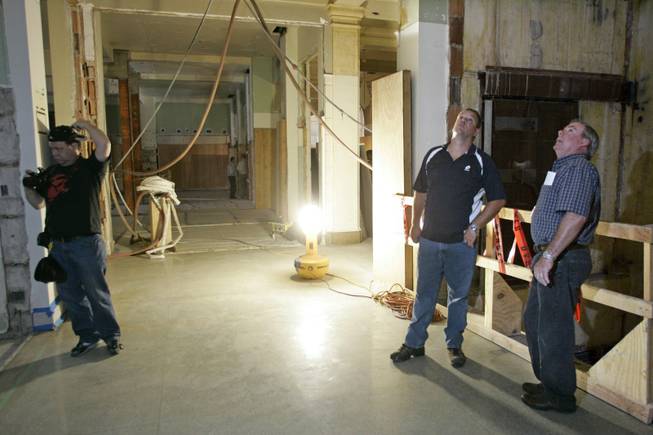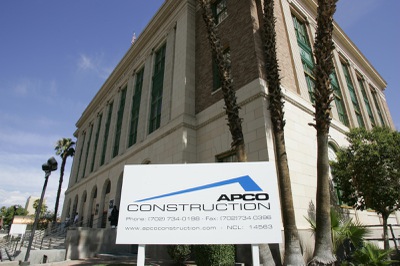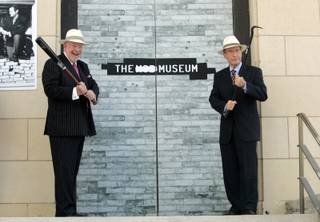
APCO Construction employees, right, scan the interior of the former post office that will become the mob museum in Las Vegas. The company won the renovation contract despite ongoing legal action against the city.
Saturday, Aug. 8, 2009 | 2 a.m.
Sun Archives
- Judge denies motion on re-evaluation of Mob Museum (7-16-2009)
- Construction company sues city over Mob Museum bid (7-7-2009)
- So sue us, you can still work for us (12-17-2007)
The most expensive arbitration in Las Vegas’ history, costing taxpayers $3.3 million and counting, involves APCO Construction.
The city claims the 23 courts at the Darling Memorial Tennis Center weren’t built properly and that each court was cracked before the center opened. In turn, APCO claims its warnings about design flaws were ignored, and is seeking $7 million in damages.
Despite being at odds with the city over the costly project, APCO, a well-connected company founded almost a half-century ago, has continued bidding for, and winning, major city contracts since the arbitration began in 2005.
Including a highly publicized $11.5 million contract to build the interior of the Las Vegas Museum of Organized Crime and Law Enforcement — better known as the mob museum — APCO has hauled in $24.7 million in construction deals the past three years.
If Las Vegas is willing to spend millions to argue that APCO failed to fulfill one city contract, how is it that the same company continues to win large construction bids with the city?
It’s a question that has been asked by city officials for years.
“Why allow them to bid if they are suing us?” Councilman Gary Reese said during a council meeting in late 2007.
The answer is in the city’s bidding rules and regulations, which state any company that presents the lowest bid for a project — and which is seen as “responsive and responsible” — wins the bid.
City Attorney Brad Jerbic said as city staff members weigh whether a bidder is responsible, they cannot consider ongoing disputes, just those that have been resolved through arbitration or in the courts.
“I find myself in a very awkward position,” Jerbic said during the City Council’s July 1 meeting, at which the mob museum contract was approved. “It’s odd to be in a position to have fought so hard to defend the city’s position in (the tennis courts) case, and yet be here today and recommending that very same person that we’re in arbitration with, as the low bidder for this particular project.”
Jerbic noted the city is happy with the job APCO performed in the two Las Vegas projects it was awarded in 2007 — $1.1 million in work at the Water Pollution Control facility and a $12.1 million contract to build a portion of Centennial Hills Park.
According to Jerbic, APCO won a bonus for work well done at the water treatment plant.
“With that particular record in mind, I don’t believe there is sufficient evidence on the record to show that they’re not ‘responsive and responsible’ for the purposes of this project,” Jerbic said.
The council agreed. Mayor Oscar Goodman and Councilwoman Lois Tarkanian abstained, and Councilman Stavros Anthony voted no. Although Anthony didn’t express concerns about APCO, he said he objected to moving forward with the mob museum in tough economic times. The rest of the council voted to approve the contract.
Tarkanian said at the meeting she didn’t want to vote on APCO’s contract because she didn’t feel she could be objective. In a recent interview, she elaborated.
“It’s the manner in which they handled themselves,” said Tarkanian, referring primarily to the company’s dealings with the city over the tennis courts. “I felt at the time that they didn’t deal fairly with the city.”
Tarkanian said she thinks APCO used cheaper-than-required materials at the tennis facility, near Washington Avenue and Durango Drive. As a result the courts cracked.
Councilman Ricki Barlow had a different take.
“The staff feels very comfortable” with APCO, Barlow said. “Even given our previous history with them, they felt like they were the best group to go with.”
The city’s award of the mob museum bid to APCO prompted a competitor, Flagship Construction Co., to file a lawsuit, claiming city officials ignored their own policies when, after the first round of bidding, Flagship came in with a lower bid than APCO. After a challenge from APCO, which claimed Flagship wasn’t qualified to do historical renovations, officials sought a new round of bidding.
On July 16 a District Court judge denied Flagship’s request for the City Council to reevaluate the bidding process. Flagship decided not to appeal.
On Tuesday, as Goodman celebrated the beginning of construction on the mob museum’s interior, APCO officials were in attendance.
Afterward, Goodman said he had to decline comment about APCO for the same reason he recused himself from voting on the contract: He is an investor in the large Apex Industrial Park with two men who work or have worked at Las Vegas Paving Corp., a company connected with APCO.
Goodman identified the men as Bob Mendenhall, the paving company’s founder and CEO, and Golden Welch, who until last year worked as the contract manager.
Neither Mendenhall nor Welch returned calls for comment.
APCO Division Manager Randy Nickerl said the portrayal of his company in the wake of the tennis center dispute is unfair. “We were tarred and feathered by the media,” he said.
Although he said he couldn’t comment in depth about the ongoing legal dispute, Nickerl said that the tennis courts were cracked, “but not to the degree that people made it out to be.”
Nickerl said North Las Vegas-based APCO, which opened in 1962, was the right fit for the mob museum.
“We’re excited about it,” he said. “I feel like we’re giving back to the community.”
The arbitration in the tennis court case has been ongoing for years. Not only has the city paid more than $3.3 million to the law firm Harrison, Kemp & Jones to handle the case, but the city could be on the hook for more than $2 million more in attorney fees should it lose.
According to a city spokesman, “The case has been fully briefed by the parties and arbitrated,” and the arbitrators’ decision is expected.



Join the Discussion:
Check this out for a full explanation of our conversion to the LiveFyre commenting system and instructions on how to sign up for an account.
Full comments policy